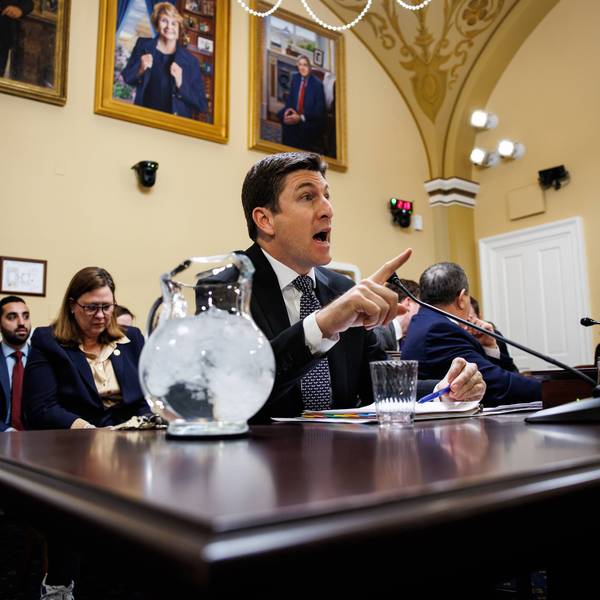The Constitution, Article VI, Section 3, states "no religious test
shall ever be required as a qualification to any office or public trust
under the United States."
James Madison, the primary author of the
Constitution, said, "An alliance or coalition between Government and
religion cannot be too carefully guarded against."
Here's
Theodore Roosevelt: "If there is one thing for which we stand in this
country, it is for complete religious freedom, and it is an emphatic
negation of this right to cross- examine a man on his religion before
being willing to support him for office."
Yet we have now
instituted such tests. We line up the presidential candidates and
cross-examine them about their faith. They respond with Sunday school
sagas about how they met God and pander to us with stories about how
prayer will help them lead. How did this come about?
In 1979,
four conservative activists, Paul Weyrich, Terry Dolan, Richard
Viguerie (all Catholics) and Howard Phillips (a Jew who'd become an
evangelical Christian) were looking for wedge issues to break up the
Democratic Party. Right-wing economics and foreign policies had no
popular appeal. So they came up with abortion, opposition to gay rights
and (thinly disguised) racism, concerns that could be found clustered
among religious conservatives. They recruited a minister, Jerry
Falwell, funded him with corporate money and started the Moral Majority.
It
succeeded beyond their wildest dreams. The Religious Right became the
base of the Republican Party, and the GOP gained control of federal
government for the first time since the Great Depression.
Democrats
were slow to respond. But politics is a business of learning what
voters want to hear and then finding sincere ways to say it. Now,
they've joined the choir. Meanwhile, sincerely religious liberals who
hate the way faith became identified with right-wing politics were
politicized in response.
Is faith a good guide to how someone
will perform in office? George W. Bush, a born again Christian, claimed
that God contacted him and said, "George," (they're on a first-name
basis) "invade Afghanistan." So he did.
Although George failed to
apprehend Osama bin Laden, God was apparently delighted, called back
and said, "George, liberate Iraq."
Bush had a lot of support in
all of this. Many people felt that he had been chosen by God to lead
America in this moment of crisis and told him so. Here we are, a
trillion dollars later, missions not accomplished, our armed forces too
used up to respond to a new threat and our nation on the verge of
bankruptcy.
If we accept it as true that God chose George and
gave him specific instructions, and then look at the results, we have
to form a very poor judgment of God, indeed, both as a human resources
administrator and as a military strategist. Or, we might say that faith
is not a good guide to competence in office.
I liked Jimmy
Carter. Many did not. They felt that he was too goody-goody and too
slow to resort to force -- the very qualities that came out of his
version of born again Christianity. American presidents of little or no
faith include Thomas Jefferson, Abraham Lincoln (though he could use
biblical language to great effect), John Adams and George Washington.
Yes, George Washington.
Washington did go to church, five or 10
times a year. But when people tried to box him into making a religious
stand, he deftly evaded them. He gave moral advice to his adopted
children, but, so far as we know, never urged religion on them.
He
wrote: "Of all the animosities which have existed among mankind, those
which are caused by difference of sentiments in religion appear to be
the most inveterate and distressing, and ought most to be deprecated.
So
if you are judging candidates by their religious stands, perhaps we
should look to the model of the old George, the one who kept whatever
faith he had to himself, and be more than a little worried about the
candidate who more closely resembles our George. The one who gets bad
guidance from God.



